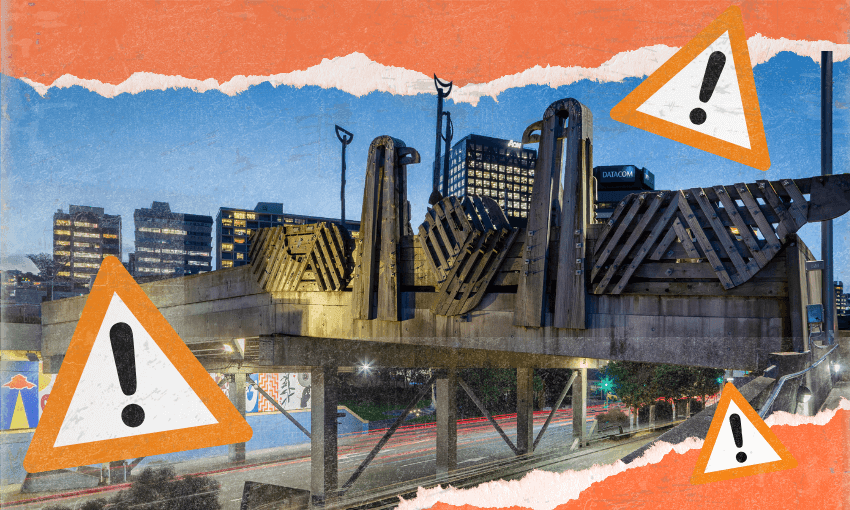It’s a Wellington icon, but we must say goodbye. It is time to demolish the bridge, argues Joel MacManus.
Wellington’s City to Sea Bridge is beautiful and weird. Its design says something about what Wellington is and the way the city sees itself. It’s been the home of many late nights and long conversations with people I love, memories captured only by a Polaroid camera and some hazy nostalgia. For a more detailed love letter to the bridge’s architecture, I highly recommend Jeremy Hansen’s essay In praise of Wellington’s City to Sea Bridge.
I’ll always love the City to Sea Bridge, but it is time to let it go. It is earthquake-prone and far too expensive to fix. It’s not just about the risk that the bridge could collapse and squash the people underneath; it’s that it could block a six-lane arterial road, which would be a nightmare for emergency responders in a natural disaster. And it’s not just about the bridge itself – the bridge is connected to the Capital E building, the sea wall, and the basement loading zone for the town hall. Repairing the bridge would require repairing the entire surrounding infrastructure.
This should not be a point of debate. This is the kind of project that makes absolutely no sense. The city council knows this; the public consultation documents don’t even offer the option of keeping the bridge. And yet there is still a growing pushback from a group of mostly older Wellingtonians, unofficially led by former deputy mayor Helene Ritchie, demanding that the council keep the bridge no matter the cost.
This is largely the same crowd that campaigned to save the earthquake-damaged Wellington Central Library building (opened in 1991) rather than tear it down and rebuild. I was recently invited to tour the construction site of the library and town hall. The staff constantly pointed out the intricate difficulties: removing and retaining heritage-listed plaster, fighting through water-logged foundations, and retrofitting base isolators. A builder told me the project would have been much, much easier if they could have just retained the front facade and the distinctive nīkau palms rather than keeping the entire building. The town hall has been a similar fool’s errand. The builders have done an impressive job modernising the space, and it will be an asset to the city once it’s open. But the council could have built something bigger and newer for less than the price tag of $330 million.
There’s a common 80s movie trope about a group of plucky kids coming together to save [insert beloved community institution] from [insert antagonist]. But it’s not cute anymore. The kids from that 80s movie aren’t the same scrappy underdogs. They’re in their 60s and are some of the wealthiest and most powerful people in the city. The new generation of kids doesn’t see these elders as heroes defending their city, they see them as stubborn toffs demanding nothing ever change. This is the same generation of local politicians and voters who invented “character areas” to stop new housing from being built in the inner suburbs. They might have thought they were protecting their neighbourhood, but to the new generation, it just looks like an effort to keep out poor people. The library and the town hall have saddled the council with eye-watering costs, but it’s not enough for these people. It will never be enough.
The word “heritage” gets tossed around too loosely these days. Historic Places Wellington chair Felicity Wong tried to rebrand the Johnsonville line as the “Johnsonville heritage train line” to stop housing developments near it. Helene Ritchie is trying to claim the City to Sea Bridge is a heritage bridge and the paving tiles of Civic Square are heritage bricks. I love old buildings. I’m a big ol’ history nerd. There are some buildings that are so important to our shared national or civic heritage that they should be preserved by law. But it can’t just be every building you liked in the 90s. We need to be serious here.
One of the amazing things about cities is that they constantly grow and reinvent themselves. The next generation will have emotional attachments to certain buildings, and they won’t be the same buildings as the previous generation. We all tell our own stories. So yes, we should celebrate the City to Sea Bridge for what it was, share our special memories, and then let it go and embrace whatever comes next.

